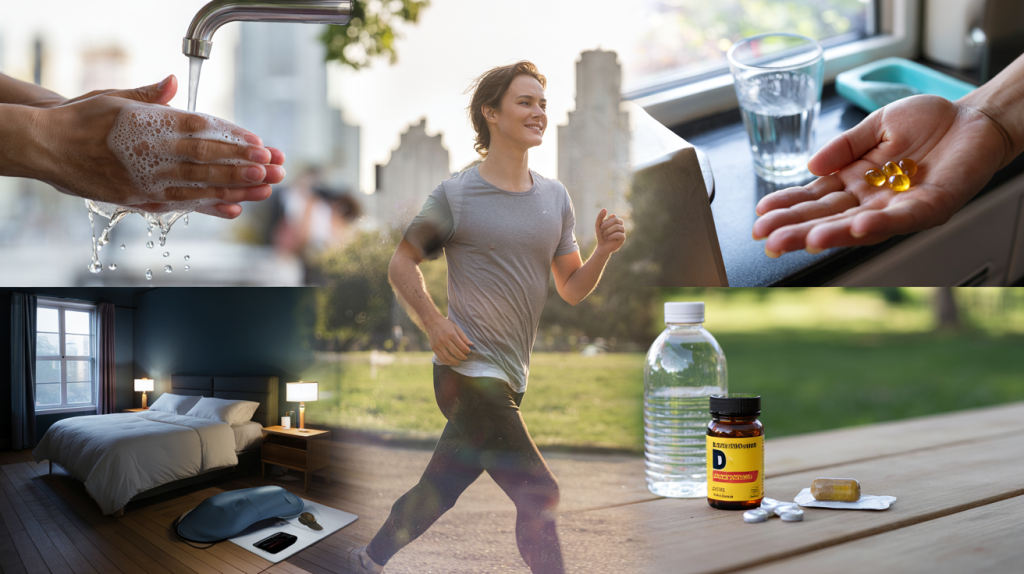Need a fast immune boost? Try this 48 hour, science backed plan using sleep, vitamin D, zinc, movement and simple habits that cut infection risk quickly.
Scratchy throat, busy calendar, zero time to slow down. When a bug is circling, rapid immune support becomes the priority. The fastest levers are simple and measurable: get a solid night of sleep, hydrate, add vitamin D if levels run low, use zinc lozenges at first symptom, move lightly, and wash hands like a pro. These moves act within hours to days.
The data tracks with common sense. Short sleep sharply increases infection odds, vitamin D supplementation reduces acute respiratory infections, zinc can shorten colds when started early, and moderate activity supports surveillance cells while hand hygiene cuts transmission. Do the low risk, high reward steps now, then build from there.
Boost your immune system quickly: what works today
Start with sleep. Adults who slept less than 6 hours were over four times more likely to catch a cold compared with 7 hours or more, in a 2015 study using rhinovirus exposure (Prather et al., Sleep 2015). Tonight, aim for 7 to 9 hours, with screens off one hour before bed.
Layer in vitamin D if intake and sun are limited. A 2017 individual participant data meta analysis found vitamin D supplementation reduced acute respiratory infections by 12 percent overall, with the largest benefit in those deficient at baseline (BMJ 2017, Martineau et al.).
Consider zinc at the first sign of symptoms. A Cochrane review reported that zinc, taken within 24 hours of onset, shortened cold duration by about a day and reduced severity (Cochrane 2013). Lozenges with zinc acetate or gluconate are the forms most studied.
Move, but keep it gentle. People engaging in near daily moderate exercise reported 43 percent fewer days with upper respiratory symptoms during a 12 week period in research led by David Nieman (Nieman et al., 2011). Think brisk walking, not interval sprints.
Evidence check: CDC, BMJ and Cochrane on fast immunity wins
Handwashing is still a heavyweight. The Centers for Disease Control and Prevention estimates proper hand hygiene reduces respiratory illness by 16 to 21 percent (CDC, updated 2021). Use soap and water for 20 seconds or an alcohol rub with at least 60 percent alcohol.
Vaccination reduces risk in the background while you do the daily steps. The CDC reports influenza vaccines reduce flu illness by 40 to 60 percent in seasons when vaccine and circulating viruses are well matched (CDC, 2024). If timing aligns, recieve it before peak local activity.
Nutrition matters for speed. Routine vitamin C does not prevent colds in the general public, but it shortened cold duration by 8 percent in adults and 14 percent in children in pooled trials (Cochrane 2013). That is meaningful when you want fewer days out.
Stress tilts the field. In classic viral challenge studies, higher psychological stress doubled the risk of developing a cold after exposure (Cohen et al., JAMA 1991). Short, structured breaks and slow breathing sessions can calm the response within minutes.
Mistakes that weaken immunity, and how to pivot now
Going too hard on workouts when rundown. Intense sessions transiently suppress certain immune parameters. Trade today’s all out training for 20 to 30 minutes of easy movement and mobility, then resume intensity once recovered.
Grazing on ultra processed snacks. Immunity relies on amino acids, omega 3s, and micronutrients. Build simple plates with protein, colorful plants, and healthy fats. For example, yogurt with berries and nuts at breakfast, chickpeas and olive oil at lunch, salmon and greens at dinner.
Waiting to hydrate. Mucosal defenses work best when hydrated. Sip water regularly and include a salty broth if active or feverish. A dry mouth or dark urine is a quick signal to drink.
Forgetting timing. Zinc helps only when started early, vitamin D supports if you are low, sleep acts the very same night. Match the tool to the window.
Your 48 hour immune plan, step by step
These actions are practical, quick, and grounded in the research above. Pick what fits your day and context.
- Tonight: target 7 to 9 hours in a cool, dark room, with devices parked an hour before bed.
- Morning: take vitamin D if intake is low or sun exposure is minimal, and follow healthcare advice on dose.
- At first symptom: use zinc lozenges within 24 hours as studied forms indicate.
- Move: add one 20 to 30 minute brisk walk or easy cycle, then some light stretching.
- Hand hygiene: wash hands before meals, after public transport, and on returning home.
- Plate: include protein in each meal, citrus or kiwi for vitamin C, and a handful of nuts.
- Stress release: 5 minutes of slow breathing, 4 seconds in and 6 seconds out, three times today.
- Seasonal layer: book a flu vaccine if you are eligible and the local season is active, per CDC guidance.
Short term wins add up quickly. Sleep recalibrates immune signaling within one night, zinc acts when started early, vitamin D helps those who are low, and moderate movement supports surveillance cells while you keep germs at bay with clean hands.
If symptoms escalate or you have a chronic condition, consult a clinician without delay. The plan above supports defenses, yet does not replace medical care when it is needed.
